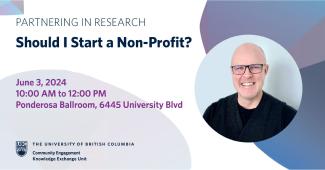I’m a Community Engaged Researcher. Should I Start a Non-Profit?
June 3, 2024, 10:00 am to 12:00 pm
This event is organized by “Partnering in Research” (PiR), a collaborative venture between the Knowledge Exchange Unit of UBC’s Vice President Research and Innovation, and the Office of Community Engagement under the Vice President External Relations.
Universities serve as valuable hubs for researchers, yet conducting community-engaged research and implementing research findings from within these institutions can be challenging for many reasons. Many projects involving public engagement or collaboration with community partners can potentially be conducted outside the university system. However, managing larger research projects or community-focused programs entails considerable administrative effort, often requiring a paid team to work over an extended period, sometimes indefinitely. So, some entity is required to administer that longer term activity.
Whether you’re looking to grow your applied research or start an implementation entity, one avenue is to establish a non-profit. While this road is not without challenges—maintaining non-profits demands time and resources—it can offer less bureaucracy, greater flexibility, and reduced administrative costs compared to university settings.
This event aims to explore the advantages and drawbacks of non-profit organizations for research, providing a decision-making framework and offering guidance for those considering launching a non-profit entity to provide a platform for their endeavors.
Date: June 3, 2024
Time: 10:00 AM to 12:00PM
Location: Ponderosa Ballroom, 6445 University Blvd
Cost: Free
Please note that there is limited space available for this workshop. We encourage interested participants to register early to secure their spot.
Learning Objectives
At the end of this workshop, participants will be able to:
- Understand the pros and cons of a for-profit versus a non-profit organization for housing a research project or implementation entity
- Evaluate the advantages and disadvantages associated with obtaining charitable status for research endeavors or implementation entities
- Understand, from case studies, the keys to success and pitfalls to avoid in starting a non-profit
- Understand what is required to effectively launch and maintain a research-focused non-profit
Speaker
Lee Herrin‘s professional journey began at BC Stats, where he was a member of the survey research team and eventually led a team of 20 researchers. He has also been actively involved in the non-profit sector for the past 25 years, contributing as both a volunteer board member and as an Executive Director of a community-based non-profit. Lee served as Chair of the Board for the Community Social Planning Council of Greater Victoria, a community-based research and program delivery organization, for six years. Since 2015, he has been offering his expertise as a consultant to non-profits, and has supported a number of non-profit organizations through the start-up phase, including four that are primarily focused on research.
